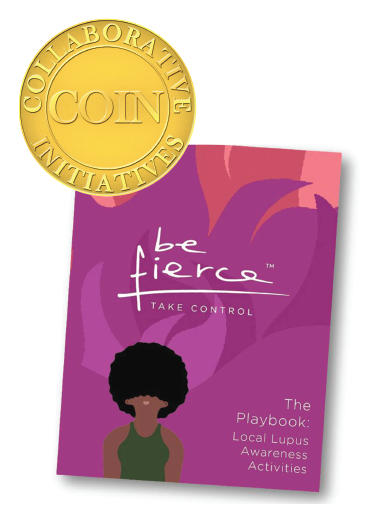The ACR’s Collaborative Initiatives (COIN) department develops and tests innovative solutions for complex rheumatology care problems. “All of the work COIN does—programs toward health equity, creating models to increase rheumatology-related capacity in places of need, building bridges with local and national patient organizations—is done on [behalf of its members],” says Dr. David Daikh. Each month The Rheumatologist will highlight one such program.
The Campus Playbook
African-American women have the highest risk of developing lupus.1-3 African-American women also experience onset of the disease at an earlier age. African-American women also tend to have increased disease symptom severity and experience more lupus-related complications than non-Hispanic white women.1,4 To close this gap, ACR members and collaborators developed a lupus awareness resource to be used at colleges and universities with high populations of African-American women.
The playbook is a downloadable step-by-step guide to planning and executing a lupus awareness activity on a college campus. This online resource provides detailed information that allows sororities, fraternities, student unions and other campus organizations to plan and hold events to increase the student body’s awareness of the signs and symptoms of lupus and the benefit of early diagnosis. For example, student groups can educate themselves about lupus using the playbook’s PowerPoint presentation and presentation script, which contains information about lupus, its disproportionate impact on women, its disproportionate impact on African-American women and why it’s important for organizations to help increase awareness.
Once educated themselves, the organizations are equipped to host hands-on lupus awareness events on campus and on social media platforms. The playbook includes tips and tools, such as detailed guidelines on venue selection, event management, speaker recruitment and how to conduct a social media campaign.
To make it easier for student organizations to follow these guidelines, the playbook contains a social media assets bundle, which includes planning sheets, graphics and content. The playbook also contains an event asset bundle, comprising event planning sheets, volunteer sign-up sheets, event flyers, event talking points and email templates that can be used to request event funding, obtain facility permissions, invite event guests and speakers, as well as attain partner organization support.
Development of the Playbook

To address the gap in lupus diagnosis and health between young African-American women and non-Hispanic whites, the COIN department convened a group of communications experts to gather key information on the intended audience through in-depth, semi-structured phone interviews, points of contact and student organization representatives at various educational institutions.
After the initial phase, several things stood out. First, the college years can be a critical time, when lifelong health behaviors can be established, but it is also a time when young adults are less likely to listen to and receive health information through traditional channels. African-American students report low acceptance of messages that seem patronizing or overbearing, and studies show young adults tend to listen to “well-meaning friends” more than adults or other authority types and that college students consistently ranked peer educators and conversations with peers as the most favorable and memorable delivery mechanism for health information.5,6
“It was important to us to learn as much as possible about our intended audience and connect with them where they are looking for health information,” says Sheryl McCalla, senior director of collaborative initiatives.
Second, providing direction on how to use the information was just as important as providing accurate, thorough information.
With these factors in mind, the group identified college campuses as the locale to deliver the messages, peer-to-peer delivery was identified as the vehicle for the messages, and a step-by-step guide was identified as the method. COIN worked with ACR members and others to design a playbook that provides scientifically accurate lupus education and awareness information that can be delivered through peer-to-peer networks.
The graphic design for the playbook was taken from a national lupus awareness campaign implemented by the ACR and the Lupus Foundation of America (befiercetakecontrol.org).
The playbook’s content development was guided by the Centers for Disease Control & Prevention’s Clear Communication Index to enhance the playbook’s clarity and ease of use for the intended audience. The artwork, format and content were reviewed by people with lupus, rheumatologists and both a health literacy expert and a cultural competency expert.
Use So Far
This spring, organizations at Agnes Scott College, Florida A&M University, Michigan State University and South Carolina State University utilized the playbook on their campuses and participated in a comprehensive evaluation of it.
In general, students thought the playbook gave them an opportunity to hold meaningful conversations about lupus and to debunk some of the myths about the disease. One student mentioned the playbook helped increase knowledge about the seriousness of lupus and how it can affect a young woman’s life. “I didn’t know what lupus was leading up to the event, I’ve barely heard of it,” says a student leader. “Now I can explain it on a deeper level than the average human being.” The playbook is now available to everyone and can be downloaded here.
Other Audiences
Importantly, the playbook is flexible enough to be repurposed and used by other types of organizations, such as faith-based groups or sports leagues, and in other settings, such as for beauty and fashion events. The playbook is a sustainable resource that stands on its own and can be customized not only by audience, but also by disease. An organization looking to raise awareness about a disease other than lupus only needs to replace the lupus educational and promotional content with content related to another disease topic.
The playbook is part of a five-year project to implement a comprehensive, sustainable grassroots and educational campaign funded by Cooperative Agreement Number, 6 NU58 DP006138, from the U.S. Department of Health and Human Services (HSS) CDC. The playbook is available online. If you use it, we would like to hear about your plans and experience. To learn more about COIN or the playbook, email us at [email protected].
References
- Pons-Estel GJ, Alarcón GS, Scofield L, et al. Understanding the epidemiology and progression of systemic lupus erythematosus. Semin Arthritis Rheum. 2010 Feb;39(4):257–268.
- Danchenko N, Satia JA, Anthony MS. Epidemiology of systemic lupus erythematosus: A comparison of worldwide disease burden. Lupus. 2006;15(5):308–318.
- Somers EC, Marder W, Cagnoli P, et al. Population-based incidence and prevalence of systemic lupus erythematosus: The Michigan Lupus Epidemiology and Surveillance Program. Arthritis Rheumatol. 2014 Feb;66(2):369–378.
- Gonzalez LA, Toloza SMA, McGwin G Jr., Alarcón GS. Ethnicity in systemic lupus erythematosus (SLE): Its influence on susceptibility and outcomes. Lupus. 2013 Oct;22(12):1214–1224.
- Johnson AL, Orbe MP, Cooke-Jackson A. ‘Let’s talk about sex’: Exploring HBCU student memorable message narratives. Howard Journal of Communications. 2014;25(3):303–323.
- White S, Park YS, Israel T, Cordero ED. Longitudinal evaluation of peer health education on a college campus: Impact on health behaviors. J Am Coll Health. 2009 Mar–Apr;57(5):497–505.


